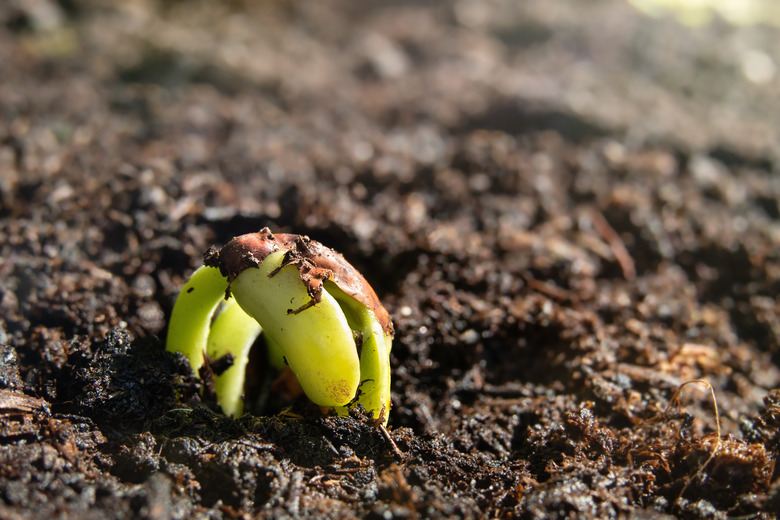How Long Does It Take Bean Plants To Germinate?
We may receive a commission on purchases made from links.
Beans (Phaseolus spp.) are among the most versatile and reliable choices for your vegetable garden, providing a green vegetable when they're fresh and tender, "shell beans" as they mature, and long-lasting dried beans at the end of the season. Runner beans even provide bold, vivid blossoms to attract hummingbirds and pollinators to your garden. Don't be in a rush to get them in the soil this spring, though. Bean germination time is heavily affected by soil temperature.
Tip
In good conditions, the germination time for beans is typically eight to 10 days.
Germination Temperature for Beans
Germination Temperature for Beans
Beans grow across much of the world and most climate zones, though they don't care much for the heat (most cultivars stop producing as temperatures reach or exceed 90 degrees Fahrenheit). At planting time, your constraint isn't usually heat but cold. Beans will germinate best when your daytime temperatures reach at least 70 degrees, and soil temperatures reach 60 degrees.
If the soil temperature is below 60 degrees when you plant, germination will be slow and uncertain. Typically, you'll see little or no germination activity until the soil does reach 60 degrees, and in the interim, there's an increased likelihood that the seeds will be damaged by moisture, be eaten by birds or rodents, or simply succumb to rot or mold.
Normal Bean Germination Time
Normal Bean Germination Time
Once your temperatures have reached the appropriate level, seed your beans directly into their chosen location within your garden. Beans have shallow root systems that are easily damaged during transplanting, so it's best not to start them indoors. Don't soak them ahead of time either. It helps some seeds, but in the case of beans, it impedes germination. Just plant them at a depth of 1 inch or so (more if you live in an arid location) and then water the soil well after they're planted.
Assuming the weather cooperates and your seeds are not washed out by a torrential spring downpour or set back by a late frost, you can expect germination within eight to 10 days. If some seeds haven't germinated after another week, you can plant new ones in those spaces to fill the gaps (or alternatively, plant a few extra and then thin them as needed).
If you plan to grow a lot of beans, it's easy to become overwhelmed when they begin producing. To avoid this, it's helpful to choose cultivars with staggered maturity dates or to plant repeatedly at two-week intervals so your harvest doesn't arrive all at once.
Germinating Beans in Unfavorable Conditions
Germinating Beans in Unfavorable Conditions
Some gardeners will face situations that make it difficult to plant under ideal conditions. Your spring may be long, cold, and wet, for example, or your season may be short enough that few cultivars have a realistic chance of bearing properly. In those cases, there are a few things you can do to tilt the odds in your favor.
One is to plant your beans in raised beds. A bed raised even a few inches above the surrounding terrain will warm more quickly in spring, shortening bean germination time, and the improved drainage they provide can protect against the problems caused by excess moisture. Another option is to plant under a row cover or cold frame (whether store-bought or a home-built DIY project). These simple shelters help the soil warm more rapidly and extend your season. This can even benefit gardeners in warm-temperature climates by allowing your beans time to bear properly before the summer's heat beats them into submission.
Recovering From Poor/No Germination
Recovering From Poor/No Germination
If you've waited through a reasonable bean germination time and have few or no sprouts to show for it, all is not (usually) lost. The first thing to check is your soil temperature with a garden thermometer. If you have an instant-read kitchen thermometer, that will work just fine, but be sure to sterilize it before you use it again for food.
If the soil temperature is within the correct range, check the date on your package of seeds. Bean seeds will last up to five years in good conditions, but if yours were stored in an unheated shed or garage where the temperature fluctuates widely, they might not be at their best. You're better off ordering fresh seeds each spring, but if it's already too late for that, you can buy some at a local store.
Once you have a supply of fresh seeds and have verified that conditions are more favorable this time (soil temperature, drainage, a cover to protect against cold), you can resow your beans and expect them to germinate within a normal time frame.
